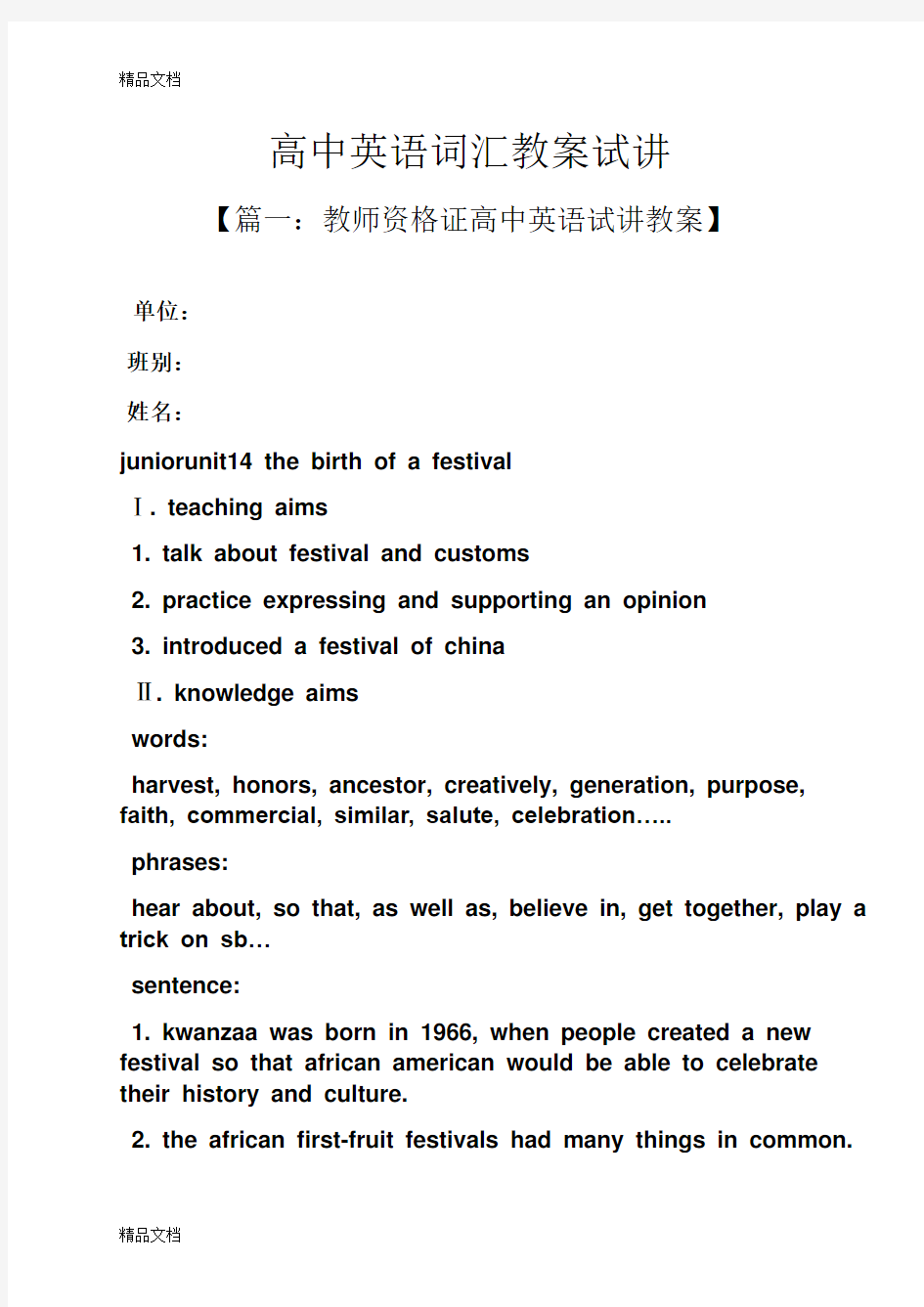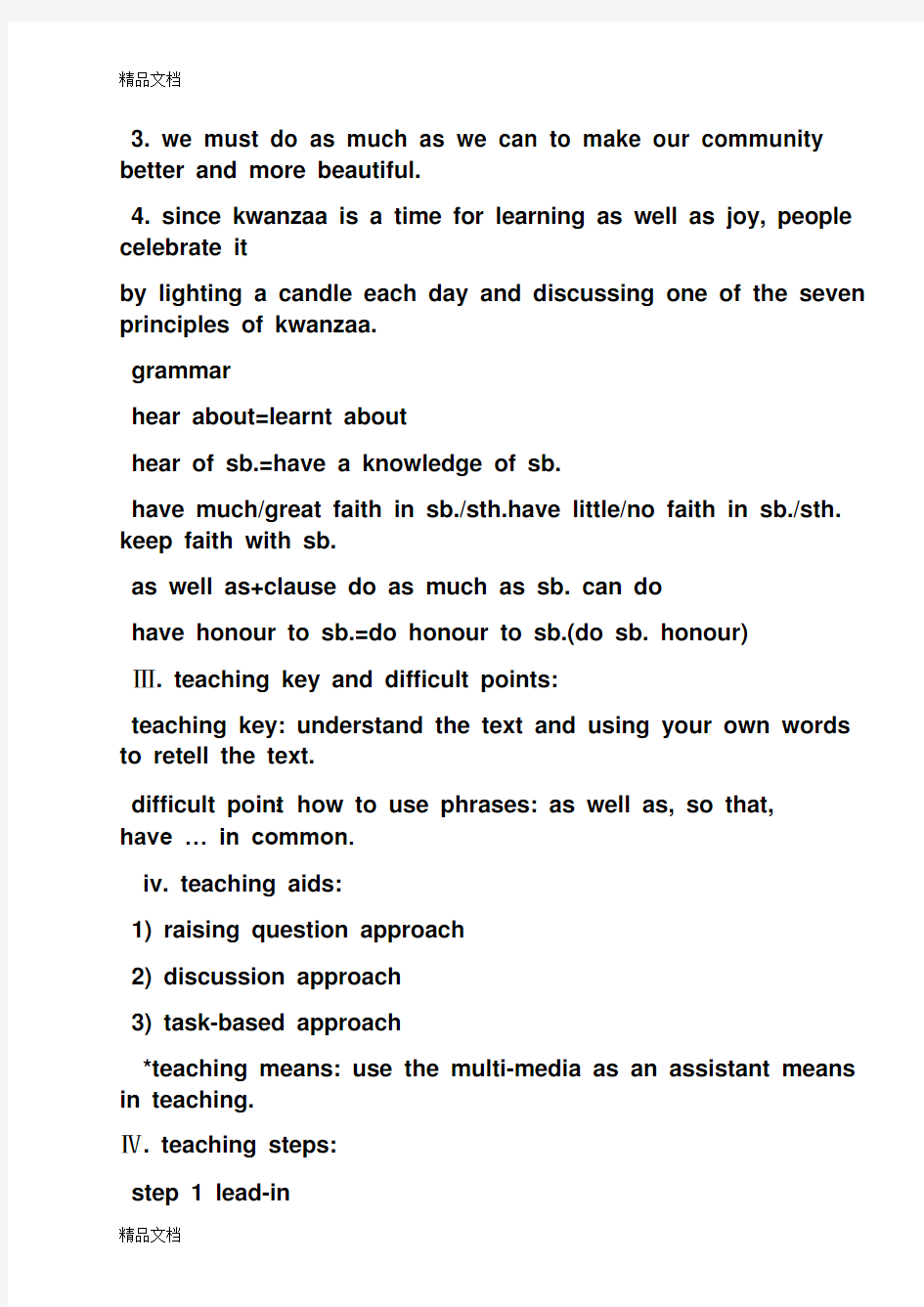高中英语词汇教案试讲培训课件


高中英语词汇教案试讲
【篇一:教师资格证高中英语试讲教案】
单位:
班别:
姓名:
juniorunit14 the birth of a festival
Ⅰ. teaching aims
1. talk about festival and customs
2. practice expressing and supporting an opinion
3. introduced a festival of china
Ⅱ. knowledge aims
words:
harvest, honors, ancestor, creatively, generation, purpose, faith, commercial, similar, salute, celebration…..
phrases:
hear about, so that, as well as, believe in, get together, play a trick on sb…
sentence:
1. kwanzaa was born in 1966, when people created a new festival so that african american would be able to celebrate their history and culture.
2. the african first-fruit festivals had many things in common.
3. we must do as much as we can to make our community better and more beautiful.
4. since kwanzaa is a time for learning as well as joy, people celebrate it
by lighting a candle each day and discussing one of the seven principles of kwanzaa.
grammar
hear about=learnt about
hear of sb.=have a knowledge of sb.
have much/great faith in sb./sth.have little/no faith in sb./sth. keep faith with sb.
as well as+clause do as much as sb. can do
have honour to sb.=do honour to sb.(do sb. honour)
Ⅲ. teaching key and difficult points:
teaching key: understand the text and using your own words to retell the text.
difficult point:how to use phrases: as well as, so that,
have … in common.
iv. teaching aids:
1) raising question approach
2) discussion approach
3) task-based approach
*teaching means: use the multi-media as an assistant means in teaching.
Ⅳ. teaching steps:
step 1 lead-in
1)have a free talk about festival in china, and then discuss the question in pre-reading on page 10.
1. how does your family celebrate the spring festival?
2. why do we celebrate the spring festival?
3. do festivals help us understand our history and culture?
4. what kind of gifts and things do people buy during major festival like christmas and the spring festival?
2)show the student 3 pictures about kwanzaa and then discuss what’s the picture about ?
step 2 listening comprehensions
1) present the students the questions before listening to the text.
2) get the students to listen to the tape and then answer the following questions.
① why did people create kwanzaa?
② many festival around the world are celebrated around the same time. why do we celebrate these festivals at these times? step 3 fast reading
1) tell the students the task of reading before they read the text.
2) after reading then summary the main idea of this text.
step 4 language points
phrases:
hear about, seven-day, celebrating, get together, so that, have…in common, harvest, honour, as well as, as much as we
can do, believe in, so that, keep faith with, show honour to sb., in honour of.
sentence:
1. kwanzaa was born in 1966, when people created a new festival so that african american would be able to celebrate
their history and culture.
2. the african first-fruit festivals had many things in common.
3. we must do as much as we can to make our community better and more beautiful.
4. since kwanzaa is a time for learning as well as joy, people celebrate it by lighting a candle each day and discussing one
of the seven principles of kwanzaa. .
step 5 intensive reading
1) tell the students the task of reading before they read the passage once again.
2) get the students to read the passage more carefully and
then discuss the following questions in groups.
【篇二:高中英语教师资格证试讲教案】
高中英语新教材unit11教案
一、教学分析
1、教材内容分析
本单元围绕“scientific achievements”这一中心话题,从科学家、
科学假说、科学理论、科学探索等方面设计听、说、读、写等一系
列教学活动。“warming up”部分设置了三个问题,要求学生就重要
的科学成就进行讨论,从而帮助学生认识重要的科学成就,了解科
学成就对社会发展、人类进步的重大贡献,同时激发学生热爱科学、
投身于科学研究的热情,探索科学研究的方法。“listening”部分设计了两道材料问题和一道开放性的情景话题。主要培养学生捕捉和筛选信息的能力,然后要求学生在一定语言输入后进行语言输出,旨在培养学生的想象能力和应用能力,通过自己的语言体会重大科学成就的意义。“speaking”部分重点训练表达意图和愿望的日常交际用语,以五人小组的活动形式组织学生扮演科学家的角色,陈述各人的研究方向并阐明其重要性来申请科研经费。“reading”部分为一篇介绍中关村的形成、发展及其重要意义的记叙文。通过对文章的理解,学习中关村人的创业精神。“language study”部分由词汇和语法两部分组成,该部分不仅教授了四种构词法知识,更鼓励学生通过四项练习,运用构词法知识提高阅读能力。“i ntegrating skills”部分设计了一个阅读和写作的练习,在学生了解四大科技成就及其重要性后,要求学生略加扩充写一篇最伟大的科学成就的文章。“tips”部分提出了说服性写作必须论点明确、论据充分,为写作提供了写作方法。
2、教学重点、难点:
本单元的重点在于借助“高科技成就”这一话题,学习、复习涉及这一话题的有关语言知识和语言技能(见教学目标),激发学生热爱科学、奋发图强、献身于科学的热情。
本单元的难点在于培养学生充分利用已有的英语知识表达自己,谈论科学家、科学成就、理想抱负。
二、教学目标
1、语言知识目标
1)要求学生掌握必要的单词、词组和句型:solar, constitution, private, grasp…it?
likely that…, make it possible for sb to do sth…,etc.
2)掌握一定量的表达“wishes and intentions”的交际功能用语。
3)同时要求学生掌握本单元出现的构词法及一些常见的前缀后缀及词根的意
义。
2、语言技能目标
通过本单元的内容培养学生良好的“听、说、读、写”的技能,使学生能运用
所学的知识解决相关情景中的一些类似问题,并能结合所给任务,综合运用新旧知识解决问题,完成任务,在此基础上鼓励学生大胆地根据各自的语言基础与能力,有个性地解决问题,就科学成就提出独特的见解。
3、情感目标
1)激发学生并提高学习英语的兴趣,乐于接受新鲜事物,勇于尝试:体现课
堂教学“主体者”的身份,积极主动地参与教学各环节,成为学习的主人:
具有个性,培养创造能力。
2)培养同学之间日常融洽相处的感情,乐于合作,善于合作的团体合作精神。
3)通过课文中出现的科学家及科学成就激励学生热爱科学、投身科学研究、探
索科学研究的方法
三、教学策略
1)开放式教学策略。以有限的课堂为载体,带学生进入广阔的知识天地。
2)引趣激趣策略。创设多种情景(境)激发学生的兴趣,只有让学生真正有了
参与的欲望,才能点燃他们的思维火花。
3)合作学习策略。合作学习强调通过师生、生生的多边互动进行人际交往、信息
交流,能满足学生个体内部需要。
4)体验成功策略。使学生在特定的完成任务过程主动积极地获得和积累相应的学
习经验,享受成功的喜悦,从而提高学习兴趣和成就动机。
四、学习策略
引导学生利用图书馆和网络资源进行一系列的自主学习、合作探究的学习策略。
对于本单元鼓励学生课前收集科技成就、中关村和美国的硅谷的资料,上课时勤思考、主动参与课堂上的各种活动。
五、单元教学设计
依据《新课程标准》及对于学生教学目标的要求,课堂设计本着教学应“以人
为本”的总的教学理念,课堂中充分利用网络资源、设计相应难度的任务,以增加教学的直观性和趣味性,提高教学效率。根据学生学习英语的特点和规律,学习阶段的侧重点,我把本单元划分六课时完成:听力、口语、阅读(2课时)、语言、写作、评价。
period 1 warming-up listening
goals: 1. get the ss to talk about what science and scientific achievements have affected the world to stimulate them to further efforts.
2. cultivate the students? ability of listening for information.
一、warming up
task 1.greeting: have a free chat with the ss about their holidays to present the topic scientific achievements
task 2. match the scientists and their scientific achievements (group work)
alexander bell electricity
thomas edisonthe first telephone
the wright brothers?the electric lamp
madame curie black holes in universe
franklintheory of gravity
steven hawkingthe first plane
elbert einstein radium
isaac newton the theory of relativity
task 3. talk about scientific achievements
1) how have the scientific achievements changed the world?
2) which one do you think is the most important? why?
3) what are some other scientific achievements that you think are important?
4) do these achievements have anything in common? if so, what?
task 4. discussion (pair work)
is this an easy job to achieve success in science research? what makes a scientist?
二、pre-listening
